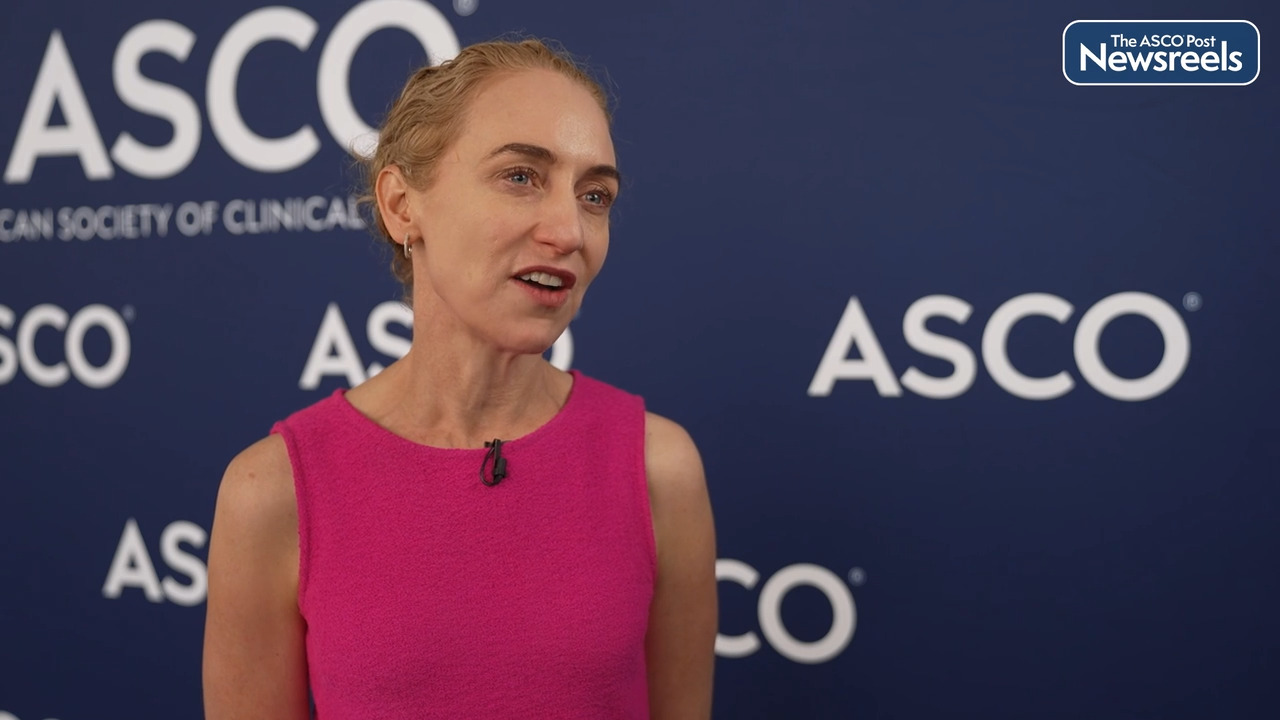James Chih-Hsin Yang, MD, PhD, on Metastatic Nonsquamous NSCLC: Evaluating Pemetrexed and Platinum With or Without Pembrolizumab
2023 ASCO Annual Meeting
James Chih-Hsin Yang, MD, PhD, of the National Taiwan University Hospital and National Taiwan University Cancer Center, discusses the latest data from the phase III KEYNOTE-789 study, which evaluated the efficacy and safety of pemetrexed plus platinum chemotherapy (carboplatin or cisplatin) with or without pembrolizumab in the treatment of adults with EGFR tyrosine kinase inhibitor–resistant, EGFR–mutated, metastatic nonsquamous non–small cell lung cancer (NSCLC) (Abstract LBA9000).
Transcript
Disclaimer: This video transcript has not been proofread or edited and may contain errors.
James Chih-Hsin Yang:
Patients who had EGFR mutation, stage four non-small cell lung cancer, the standard of care is tyrosine kinase inhibitors as a first line. When they fail, they have to receive chemotherapy as a standard of care. KEYNOTE-789 is a randomized phase three study, testing whether adding pembrolizumab to the standard chemotherapy is going to help overall survival and progression-free survival.
492 patients who are randomized into two arms. One, pembrolizumab plus end of care chemotherapy versus chemotherapy plus placebo. The co-primary endpoints were progression-free survival and overall survival. There were three interim analysis. Progression-free survival time were done at the interim analysis two.
The hazard ratio was 0.8, which nearly touched the statistical significant P value of boundary 0.0117 and therefore miss the endpoint. The overall survival endpoint was done at the interim analysis three, which was then final analysis 42 months after the last patient's randomized. The overall survival hazard ratio was 0.84, was also statistically not significant.
We also look at the pathological and clinical factors. We try to figure out whether patients with different characteristics can benefit from pembrolizumab adding to chemotherapy. Unfortunately, there was only one factor that seems to help these patients, which is PD-L1 status. Patients who had PD-L1 more than 1%, which is close to 50% of the population, the hazard ratio for overall survival was 0.77. Where those patients who did not have PD-L1 expression, their hazard ratio for overall survival was 0.91. So, we had a study that we cannot change the standard practice, yet the finding that PD-L1 status may help us to choose a patient when asked for future study.
Related Videos
The ASCO Post Staff
Lisa A. Carey, MD, of the University of North Carolina at Chapel Hill, and Dennis J. Slamon, MD, PhD, of the University of California, Los Angeles, discuss phase III study findings on ribociclib plus endocrine therapy as adjuvant treatment in patients with hormone receptor–positive, HER2-negative early breast cancer. When added to standard-of-care endocrine therapy, ribociclib improved invasive disease–free survival with a well-tolerated safety profile (Abstract LBA500).
The ASCO Post Staff
Narjust Florez, MD, of Dana-Farber Cancer Institute, and Filippo Gustavo Dall’Olio, MD, of Institut Gustave Roussy, discuss circulating tumor DNA tumor fraction, and its link to survival in patients with advanced non–small cell lung cancer (NSCLC) treated with maintenance durvalumab in the UNICANCER SAFIR02-Lung/IFCT1301 trial. Tumor fraction was positive in 16% of patients randomly assigned to receive durvalumab in the study. This population seems to have a limited benefit from maintenance durvalumab after induction chemotherapy (Abstract 2516).
The ASCO Post Staff
Tycel J. Phillips, MD, and Alex F. Herrera, MD, both of the City of Hope National Medical Center, discuss findings from the POLARIX study, which provided the largest prospectively collected circulating tumor DNA (ctDNA) data set on patients with previously untreated diffuse large B-cell lymphoma. Achieving ctDNA-negative status was associated with improved outcomes when patients were treated with polatuzumab vedotin-piiq plus combination chemotherapy vs combination chemotherapy alone (Abstract 7523).
The ASCO Post Staff
Georgina V. Long, MD, PhD, of Melanoma Institute Australia and The University of Sydney, discusses new data showing that patients with resected stage IIB/C melanoma who were treated with adjuvant nivolumab had prolonged recurrence-free survival compared with placebo across all biomarker subgroups. The baseline biomarkers most predictive of prolonged recurrence-free survival with nivolumab were high interferon gamma score, high tumor mutational burden, CD8 T-cell infiltration, and low C-reactive protein (Abstract 9504).
Ajay K. Nooka, MBBS, of Winship Cancer Center of Emory University, discusses findings from a pooled analysis of MagnetisMM studies. The data showed that, in patients with relapsed or refractory multiple myeloma who have not yet been treated with B-cell maturation antigen–directed therapies, elranatamab was efficacious and well tolerated.




